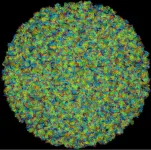(Press-News.org) The reason why targeted treatment for non-small cell lung cancer fails to work for some patients, particularly those who have never smoked, has been discovered by researchers from UCL, the Francis Crick Institute and AstraZeneca.
The study, published in Nature Communications, shows that lung cancer cells with two particular genetic mutations are more likely to double their genome, which helps them to withstand treatment and develop resistance to it.
In the UK, lung cancer is the third most common type of cancer and the leading cause of cancer death. Around 85% of patients with lung cancer have non-small cell lung cancer (NSCLC), and this is the most common type found in patients who have never smoked. Considered separately, ‘never smoked’ lung cancer is the fifth most common cause of cancer death in the world.
The most common genetic mutation found in NSCLC is in the epidermal growth factor receptor gene (EGFR), which enables cancer cells to grow faster. It is found in about 10-15% of NSCLC cases in the UK, particularly in patients who have never smoked.
Survival rates vary depending on how advanced the cancer is, with only around a third of patients with Stage IV NSCLC and an EGFR mutation surviving for up to three years.
Lung cancer treatments that target this mutation, known as EGFR inhibitors, have been available for over 15 years. However, while some patients see their cancer tumours shrink with EGFR inhibitors, other patients, particularly those with an additional mutation in the p53 gene (which plays a role in tumour suppression), fail to respond and experience far worse survival rates. But scientists and clinicians have so far been unable to explain why this is the case.
To find the answer, the researchers re-analysed data from trials of the newest EGFR inhibitor, Osimertinib, developed by AstraZeneca. They looked at baseline scans and first follow-up scans taken a few months into treatment for patients with either EGFR-only or with EGFR and p53 mutations.
The team compared every tumour on the scans, far more than were measured in the original trial. They found that for patients with just the EGFR mutations, all tumours got smaller in response to treatment. But for patients with both mutations, while some tumours had shrunk others had grown, providing evidence of rapid drug resistance. This pattern of response, when some but not all areas of a cancer are shrinking in response to a drug treatment within an individual patient, is known as a ‘mixed response’ and is a challenge for oncologists caring for patients with cancer.
To investigate why some tumours in these patients might be more prone to drug resistance, the team then studied a mouse model with both the EGFR and p53 mutation. They found that within resistant tumours in these mice, far more cancer cells had doubled their genome, giving them extra copies of all their chromosomes.
The researchers then treated lung cancer cells in the lab, some with just the single EGFR mutation and some with both mutations, with an EGFR inhibitor. They found that within five weeks of exposure to the drug, a significantly higher percentage of cells with both the double mutation and double genomes had multiplied into new drug-resistant cells.
Professor Charles Swanton, from UCL Cancer Institute and the Francis Crick Institute, said: “We’ve shown why having a p53 mutation is associated with worse survival in patients with non-smoking related lung cancer, which is the combination of EGFR and p53 mutations enabling genome doubling. This increases the risk of drug-resistant cells developing through chromosomal instability.”
Non-small cell lung cancer patients are already tested for EGFR and p53 mutations, but there is currently no standard test to detect the presence of whole genome doubling. The researchers are already looking to develop a diagnostic test for clinical use.
Dr Crispin Hiley, from UCL Cancer Institute and a Consultant Clinical Oncologist at UCLH, said: “Once we can identify patients with both EGFR and p53 mutations whose tumours display whole genome doubling, we can then treat these patients in a more selective way. This might mean more intensive follow up, early radiotherapy or ablation to target resistant tumours, or early use of combinations of EGFR inhibitors, such as Osimertinib, with other drugs including chemotherapy.”
This work was supported by the Francis Crick Institute, which receives its core funding from Cancer Research UK, the UK Medical Research Council, and Wellcome.
Notes to Editors:
For more information, please contact:
Dr Matt Midgley
+44 (0)20 7679 9064
m.midgley@ucl.ac.uk
Publication:
Sebastijan Hobor, Maise Al Bakir, Crispin T. Hiley and Marcin Skrzypski et al. ‘Heterogeneous responses to EGFR tyrosine kinase inhibition in non-small cell lung cancer result from chromosomal instability facilitated by whole genome doubling and TP53 co-mutation’ is published in Nature Communications and is strictly embargoed until Thursday 13 June 2024 at 10:00 BST / 05:00 ET.
DOI: https://doi.org/10.1038/s41467-024-47606-9
About UCL – London’s Global University
UCL is a diverse global community of world-class academics, students, industry links, external partners, and alumni. Our powerful collective of individuals and institutions work together to explore new possibilities.
Since 1826, we have championed independent thought by attracting and nurturing the world's best minds. Our community of more than 50,000 students from 150 countries and over 16,000 staff pursues academic excellence, breaks boundaries and makes a positive impact on real world problems.
The Times and Sunday Times University of the Year 2024, we are consistently ranked among the top 10 universities in the world and are one of only a handful of institutions rated as having the strongest academic reputation and the broadest research impact.
We have a progressive and integrated approach to our teaching and research – championing innovation, creativity and cross-disciplinary working. We teach our students how to think, not what to think, and see them as partners, collaborators and contributors.
For almost 200 years, we are proud to have opened higher education to students from a wide range of backgrounds and to change the way we create and share knowledge.
We were the first in England to welcome women to university education and that courageous attitude and disruptive spirit is still alive today. We are UCL.
www.ucl.ac.uk | Follow @uclnews on Twitter | Read news at www.ucl.ac.uk/news/ | Listen to UCL podcasts on SoundCloud | View images on Flickr | Find out what’s on at UCL Minds
The Francis Crick Institute is a biomedical discovery institute dedicated to understanding the fundamental biology underlying health and disease. Its work is helping to understand why disease develops and to translate discoveries into new ways to prevent, diagnose and treat illnesses such as cancer, heart disease, stroke, infections, and neurodegenerative diseases.
An independent organisation, its founding partners are the Medical Research Council (MRC), Cancer Research UK, Wellcome, UCL (University College London), Imperial College London and King’s College London.
The Crick was formed in 2015, and in 2016 it moved into a brand new state-of-the-art building in central London which brings together 1500 scientists and support staff working collaboratively across disciplines, making it the biggest biomedical research facility under a single roof in Europe.
http://crick.ac.uk/
END
Why many lung cancer patients who have never smoked have worse outcomes
2024-06-13
ELSE PRESS RELEASES FROM THIS DATE:
APA poll finds younger workers feel stressed, lonely and undervalued
2024-06-13
Younger workers are struggling with feelings of loneliness and a lack of appreciation at work and tend to feel more comfortable working with people their own age, according to a survey by the American Psychological Association.
The 2024 Work in America survey, conducted online by The Harris Poll of more than 2,000 working U.S. adults, found that three in 10 U.S. workers reported that people in their organization who are not close to their age do not see the value in their ideas (32%). That number was significantly higher for workers aged ...
Shedding light on the state of genetic counseling for hereditary transthyretin-related amyloidosis
2024-06-13
Early detection and treatment of hereditary transthyretin-related amyloidosis via genetic counseling are crucial. Yet, not all at-risk individuals seek genetic counseling, and management for presymptomatic carriers remains unclear. To tackle these knowledge gaps, a research team from Japan conducted a retrospective study on over 200 people who sought genetic counseling at a medical center, shedding light on the current advantages and limitations of current practices.
Hereditary transthyretin-related amyloidosis (AATRv amyloidosis) is a rare inherited ...
Trametinib shows promise for children with relapsed or refractory JMML
2024-06-13
Bottom Line: The MEK inhibitor trametinib (Mekinist) was an effective treatment for pediatric patients with relapsed or refractory juvenile myelomonocytic leukemia (JMML) enrolled in a phase II clinical trial, with seven of 10 patients alive after a median of two years.
Journal in Which the Study was Published: Cancer Discovery, a journal of the American Association for Cancer Research (AACR)
Authors: The senior author is Mignon Loh, MD, who is the director of the Ben Towne Center for Childhood Cancer Research and the head of the Division of Pediatric Hematology, Oncology, Bone ...
New way to spot beetle-killed spruce can help forest, wildfire managers
2024-06-13
A new machine-learning system developed at the University of Alaska Fairbanks can automatically produce detailed maps from satellite data to show locations of likely beetle-killed spruce trees in Alaska, even in forests of low and moderate infestation where identification is otherwise difficult.
The automated process can help forestry and wildfire managers in their decisions. That’s critical as the beetle infestation spreads.
The Alaska Division of Forestry and Fire Protection calls the spruce beetle “the most damaging ...
New study reveals combined use of Donepezil and Memantine increases the probability of five-year survival of Alzheimer’s disease patients
2024-06-13
Alzheimer's disease is the world’s most common neurodegenerative disease, affecting more than 50 million people globally. Alzheimer’s disease is also among the most fatal, landing as one of the top five causes of death worldwide. However, most currently available treatments are limited to alleviating the disease’s symptoms.
Now, a new study led by Chapman University researchers has explored the efficacy of using two existing Alzheimer’s disease drugs simultaneously to reduce mortality. It is one of the largest and ...
Number of over 65s with type 1 diabetes has almost tripled in 30 years
2024-06-13
The number of people aged 65 and older with type 1 diabetes increased from 1.3 million in 1990 to 3.7 million in 2019, while death rates fell 25% from 4.7 per 100,000 population in 1990 to 3.5 in 2019, finds an analysis of data from over 200 countries and regions in The BMJ today.
Overall, the results show that more people with type 1 diabetes are living longer. However, death rates fell 13 times faster in high income countries compared with low and middle income countries, indicating that substantial ...
Brain regions that bias the brain’s response to pleasure in bipolar disorder identified
2024-06-13
Momentary shifts in mood, even those lasting just a matter of seconds, profoundly alter the brain’s response to pleasurable experiences in people with bipolar disorder, finds a new study by UCL researchers.
Previous research shows that mood can make us experience events in more positive or negative light – irrespective of having bipolar disorder. When we are in a good mood, we are drawn to viewing things more favourably – causing the good mood to rollover and gain momentum.
Equally, when we are upset we get drawn into perceiving bad outcomes as even worse, causing us to remain upset or get even more upset.
This “momentum” in mood can bias how we perceive events ...
Researchers in US, Ukraine simulate cell activity at ‘breathtaking’ timescales
2024-06-12
LAWRENCE — A partnership between scientists at the University of Kansas and collaborators in Europe, including war-torn Ukraine, will result in computer models of biological cells likely to hasten health breakthroughs by simulating molecular interactions inside cells with near experimental accuracy at vastly longer timescales than similar efforts.
The research is supported by the National Science Foundation’s IMPRESS-U (International Multilateral Partnerships for Resilient Education and Science System in Ukraine) program that aims to “support excellence in science and engineering research, education, and innovation through international collaboration and ...
NSF CAREER grant to investigate design of fluorescent protein sensors with computer simulations that may aid human health and disease
2024-06-12
DETROIT — Alice Walker, Ph.D., assistant professor of chemistry in the College of Liberal Arts and Sciences at Wayne State University, received a Faculty Early Career Development (CAREER) award from the National Science Foundation to fund her research on applying computational chemistry to the understanding and rational design of new fluorescent protein (FP) sensors.
“A sensor, chemically speaking, is a molecule that turns on or off in response to certain stimuli,” said Walker. “Proteins are good sensors because they have a florescent element; they essentially glow in the dark in response to when it touches something. ...
Study shows politicians deny misdeeds because we want to believe them
2024-06-12
Why do politicians lie and deny when they are caught up in political scandal?
According to a newly published study led by a University of Nebraska–Lincoln political scientist, the answer may be that their supporters prefer a less-than-credible denial to losing political power and in-group status because of a discredited standard-bearer.
“The driving question of our research is whether people are actually incentivizing politicians to deny wrongdoing and escape accountability,” said Pierce Ekstrom, assistant professor of political science at Nebraska.
“Certainly, there’s a very strong norm ...



